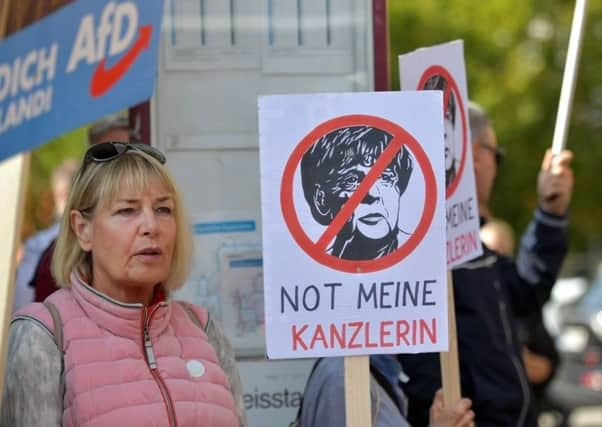Angela Merkel set to win fourth term as Germans go to the polls


Merkel, already chancellor for 12 years, has run a low-key campaign emphasising the country’s falling unemployment, strong economic growth, balanced budget and overall stability in a volatile world.
Pre-election polls give her conservative Union bloc a lead of 13 to 17 points over the centre-left Social Democrats led by her challenger, Martin Schulz. The two are traditional rivals but have governed together in a “grand coalition” of the biggest parties for the past four years. Schulz returned to German politics in January after years as the European Parliament’s president. He has struggled to gain traction with a campaign that centred on righting perceived economic injustices for Germany’s have-nots. It has also been difficult for him to carve out clear differences with the conservatives.
Advertisement
Hide AdAdvertisement
Hide AdMerkel offered Germans “a combination of the experience of recent years, in which we have achieved plenty, and curiosity for the new” during the pair’s only head-to-head debate of the campaign.
Merkel is pledging to get from Germany’s current 5.7 per cent unemployment rate - down from 11 per cent when she took office in 2005 - to “full employment” by 2025. She pledges limited tax cuts and to keep Germany’s borrowing at zero.
And she offers a steady hand internationally, with long experience of European Union negotiating marathons, tough talks with Russian President Vladimir Putin, and now of engaging cautiously with President Donald Trump.
Polls suggest that Merkel’s Christian Democratic Union and its Bavaria-only allies, the Christian Social Union, will come in a few points short of the 41.5 per cent support they had in 2013 - Merkel’s best result yet. They put Schulz’s Social Democrats around or below the 23 per cent they won in their worst showing yet in post-Second World War Germany, which was recorded in 2009.
Hans Kundnani, an expert at the German Marshall Fund think-tank, said it was a “foregone conclusion” that Merkel would be the next chancellor.
The difficult part may be forming a new government. Merkel can hope for a narrow majority for a centre-right coalition with the pro-business Free Democrats, with whom she ran Germany from 2009 to 2013, or the traditionally left-leaning Greens.
More likely is a result that leaves her either seeking an untried coalition with both those parties, or another “grand coalition” with the Social Democrats. The latter party has pledged to ballot its membership on any coalition deal, which could be tricky if it performs very badly.
A government with the Free Democrats aboard might take a tougher stance on efforts to reform the eurozone and bail out strugglers. The Greens want a faster transition away from gas and diesel cars and a wealth tax on the rich.
Advertisement
Hide AdAdvertisement
Hide AdThe junior partners, whoever they are, will have “limited influence over the overall direction of policy”, Kundnani wrote in an analysis. He added that “in so far as differences exist between the four parties that could become part of the government, they are a matter of details and nuances”.
Polls show four parties competing for third place, with support between 7 and 12 per cent – the Free Democrats, who look set to return to parliament after a four-year absence; the Greens, the Left Party and Alternative for Germany, or AfD. AfD has swung right since it narrowly missed entering parliament in 2013. It has been helped by opposition to Merkel’s decision to allow in large numbers of refugees.